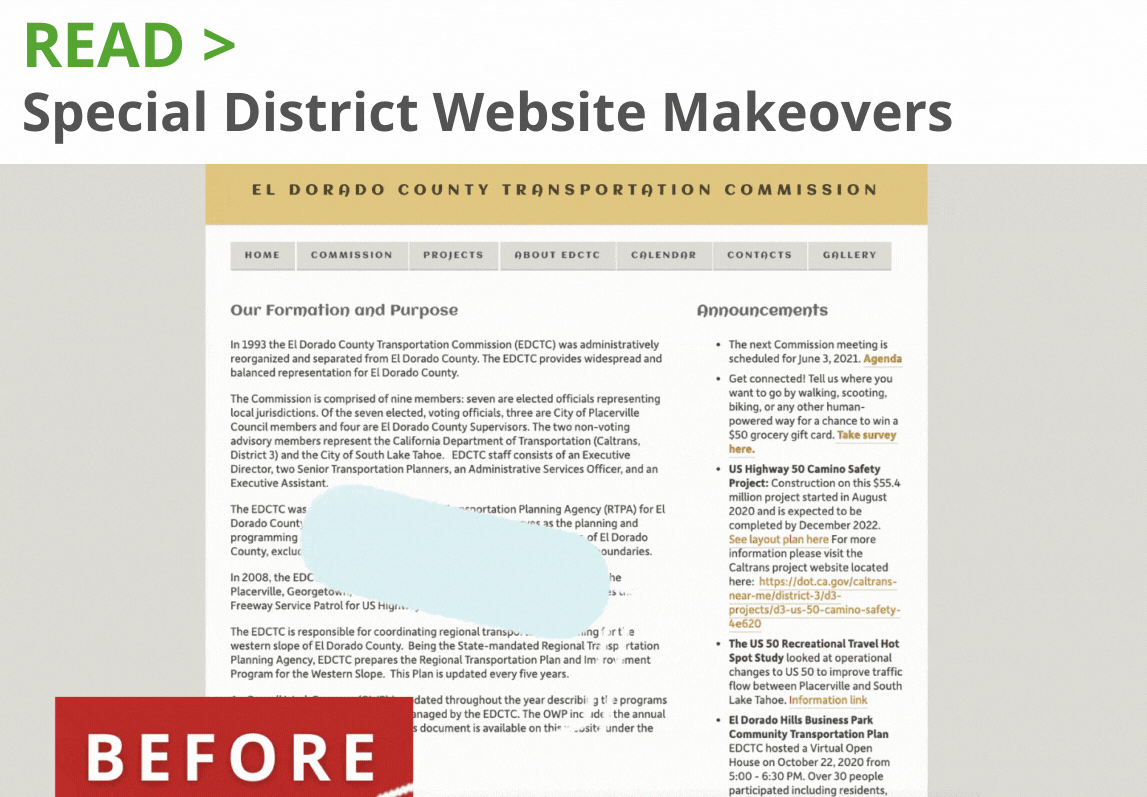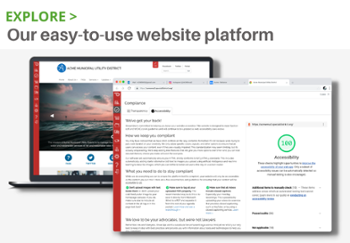There are a few formatting requirements that apply to local government agencies in California: Section 508 (for visitors with disabilities); AB 169 guidelines for anything considered “open data;” and AB 2257, which governs formatting and posting requirements for any agency’s main governing body’s agenda. In this article we’ll touch on the first two; to learn more about AB 2257 and home page agenda posting, check out this related article.
Section 508 - website accessibility
Section 508 is a group of federal guidelines that govern all sorts of items related to accessibility for people with disabilities – including things like wheelchair ramps, door widths, etc. It also includes a section about website accessibility, and in California, we point to Section 508 for our local guidelines as well.
Compliance with Section 508 changed in January 2018, and now Section 508 aligns with WCAG (Website Content Accessibility Guidelines) 2.0 AA standards. These standards govern things like contrast (foreground vs. background color for readability of text), text size, alt text for images, and more. The intention is that your website be “visitable” by people who may be using a screen reader or other assistive device. You can test your site using many common online testers. One of our favorites is (achecker.ca) and here is a guide to using it:
- Visit achecker.ca, and enter your URL in the box:
- Make sure the WCAG 2.0 AA option is checked (you’ll need to expand the “Options” link), and click the “Check it” button.
- When the results return, ensure that you don’t have anything listed under “Known problems”
- If your site does have known problems, use the export feature (top right) to export the report as a PDF and share it with your website vendor to get those errors fixed!
While testers are not perfect, doing your best to comply goes a long way toward proving intention to be accessible. And it’s important! Some studies show that up to 15% of the population has a disability of some sort, and many of these disabilities make it difficult for visitors to access a non-compliant site.
The price of non-compliance
We’re often asked, what’s the big deal if you aren’t Section 508 compliant? It can be very, very expensive to be sued over noncompliance:
Within forty-five (45) days after the effective date of this Agreement... any agent acting on behalf of either the University or the Board shall pay the Complainant a total sum of $23,543.00. Such payment(s) shall be made by check(s) payable to the order of the Complainant and delivered to the Complainant via overnight, private courier.
(That was for one class that was not accessible to a blind student.)
Target to pay $6 million to settle site accessibility suit. Target has settled a class-action lawsuit with the National Federation of the Blind ...
And cases are on the rise:
Most agencies simply settle out of court, because if your website can be proven to be non-compliant, you’re unlikely to win a case, and will have to pay the other party’s attorney fees.
Learn more about Section 508 in our FAQ article, more about WCAG 2.0 on the W3C website, or visit the federal Section 508 informational site.
AB 169 - Open Data guidelines
AB 169 is a California law laying the groundwork for what can be called “Open Data.” The bad news is that there’s really no way to comply with the requirements, as they were left intentionally vague to plan for future additions (note the part in bold):
“This bill, if a local agency, except a school district, maintains an Internet Resource, including, but not limited to an Internet Web site, Internet Web page, or Internet Web portal, which the local agency describes or titles as “open data,” and the local agency voluntarily posts a public record on that Internet Resource, would require the local agency to post the public record in an open format that meets specified requirements, including, among others, that the format is able to be retrieved, downloaded, indexed, and searched by a commonly used Internet search application.”
Um… among what others?
The good news is that this requirement only applies to content posted on the website that is called “open data” … so, as long as you don’t call anything “open data” you don’t need to worry too much about this law. Our feeling is that you should leave the open data to companies who specialize in the field, and simply link out to their portal.

